Cheesemaking is steeped in tradition, some of which extends back thousands of years. These ancient ways and the dedicated people who keep them alive are worth venerating, while at the same time it’s exciting to watch those blazing cheese trails in new directions. The following stories spotlight nine trailblazers whose contributions to the wide world of cheese are already impressive, and we can’t wait to see what they do next.

Kyra James
Cheese Educator | Own Your Funk
Cheese was the happiest accident of my life,” says Kyra James, who was introduced to the cheese world while working at Formaggio Kitchen in Boston. With a plan to work in food marketing, she originally took the job to help pay for a Master’s in Gastronomy at Boston University. “I thought I wanted to work for corporate America,” James says. “Once I learned about cheese, I wanted to stay as close to the land and the animals as I could.” She drew on her customer service background to focus on cheese education, working as the food and wine program manager at the Boston Center for Adult Education, and during the pandemic as the virtual event manager for Antonelli’s Cheese Shop in Austin, Texas, hosting online tastings for clients such as Capital One and the University of Texas. “The best part of that was learning about Antonelli’s culture and their brand behind the scenes, because they’re so good at staying true to who they are,” she says.
In 2019, while achieving personal success through sobriety, “my attention was heightened to how disenfranchised cultures lean on addictive substances while also seeing their growing disconnects to the food they eat,” James says. At the height of the pandemic, she launched Own Your Funk (OYF) to help bring food education and empowerment to people who look like her. “Own Your Funk embodies more than cheese. It’s about understanding who you are from the outside in—using your senses and learnings as power to thrive in the ever-changing American food space.” One of her recent projects was developed for the Carter Burden/Leonard Covello Senior Program in East Harlem, New York. After they received a grant for innovative education in their nutrition program, they reached out to her about a one-hour cheese tasting. She ended up presenting a four-part series: The first session started virtually in Vermont, where she introduced participants to a dairy farm and the cheesemaking process. The second and third sessions were “Cheese 101” and nutrition-focused, respectively, and the final session was a live cheese tasting. “The progression of knowledge made them more open to trying the cheeses,” James says.
Now back in her hometown of Danbury, Connecticut, she’s pitched similar customized educational programs to other organizations while substitute teaching, coaching track, and developing consumer-facing experiences for OWF. A board member for the Cheese Culture Coalition and a member of the American Cheese Society Education Committee, James is working on several fronts to reach a more diverse audience for cheese. “I focus on meeting people where they are,” she says. “My hope is that if we offer it and talk about cheese in a new way, they will be more interested in being part of our community.”
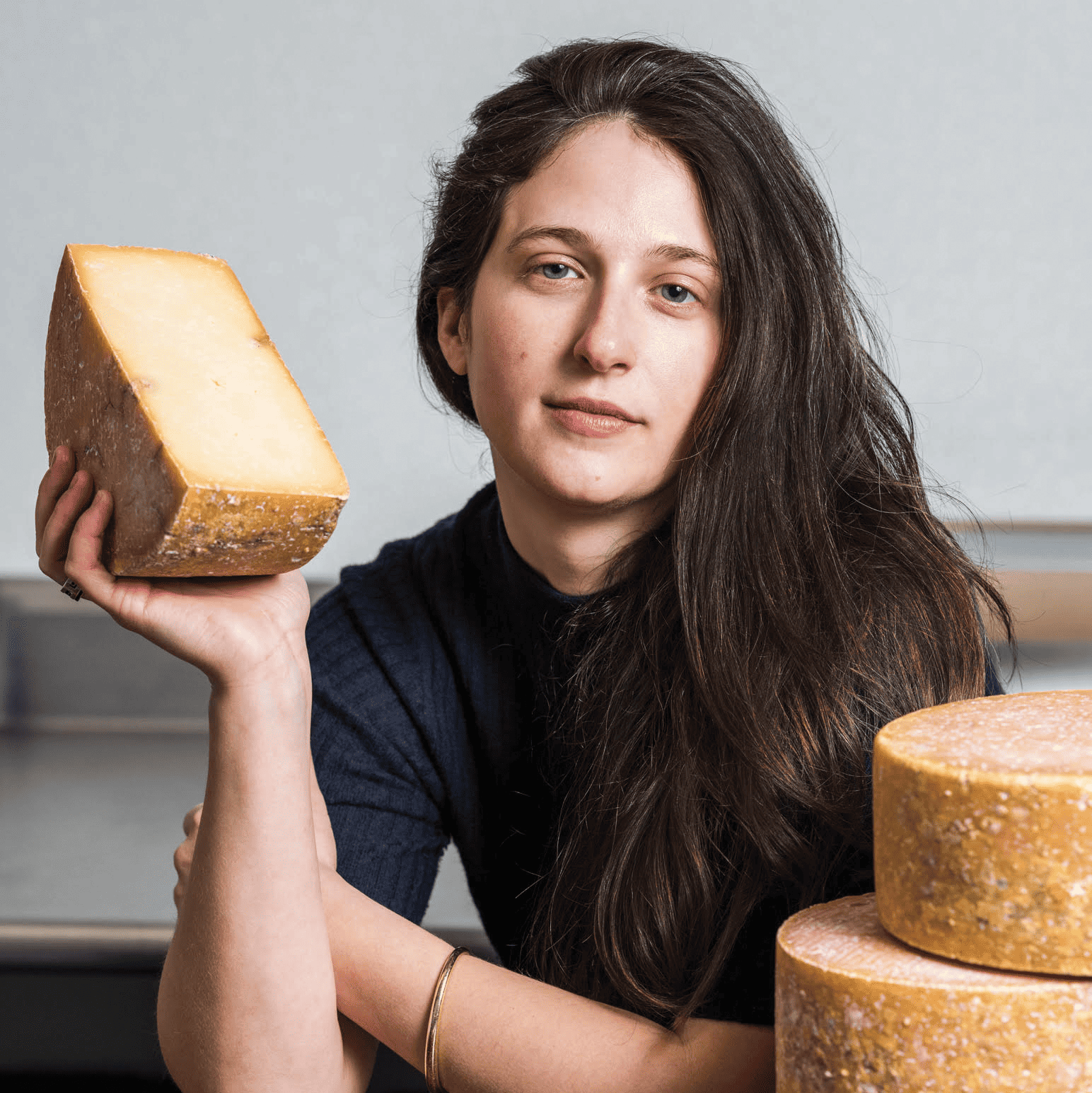
Caroline Hesse
Proprietor | C. Hesse Cheese | Brooklyn, N.Y.
When Caroline Hesse launched her distribution company, C. Hesse Cheese, last fall, it was somewhat of a natural transition from her previous job at Crown Finish Caves in Brooklyn, New York, which shuttered in May 2022. “As Crown Finish was closing and I was thinking about what I wanted to do next, opening my business felt like the path of least resistance,” she says. “Crown Finish really trained me so well to run a small business. Over my six years there, I onboarded new customers, I did the cold calling, I did the tastings, invoicing, fulfillment.”
At C. Hesse Cheese, Hesse carries about 20 cheeses from four to five different producers, primarily American artisan makers, plus Switzerland’s Jumi. Most of her business is to wholesale customers but she also has an online shop for consumers. Because she doesn’t require minimum orders, many of her clients are small retailers. “I love helping them build their programs,” she says. There’s such a wealth of cheeses out there that I want to carry and represent, but I’m trying not to bite off more than I can chew.”
Hesse first told me about the plans for her business at the 2022 Summer Fancy Food Show in New York, shortly after Crown Finish Caves closed. She had thought about going into consulting but wanted to be more directly involved with the cheese. “I had customers who were texting me after we had run out of inventory asking where to get cheeses. So, I told everybody to give me a minute and I would get them the cheese.” She launched a Kickstarter campaign that summer and moved into her warehouse in November.
Several months in, she’s “finally had time to sit down and unknot all the yarn that’s in my brain. I realized that since the business started, I was trying to figure out this thing that I was feeling—it’s not anxiety, it’s not dread. It’s just overwhelmed.” But for Hesse, who admits that she gets bored easily, that’s not necessarily a bad thing. “I feel like my brain is changing in how I process. It’s what I’ve always wanted—to have multiple things going at once. Logistics is one part of my brain, writing descriptions of cheeses is another part of my brain, and networking and meeting people is another part of my brain— and I use them all.”
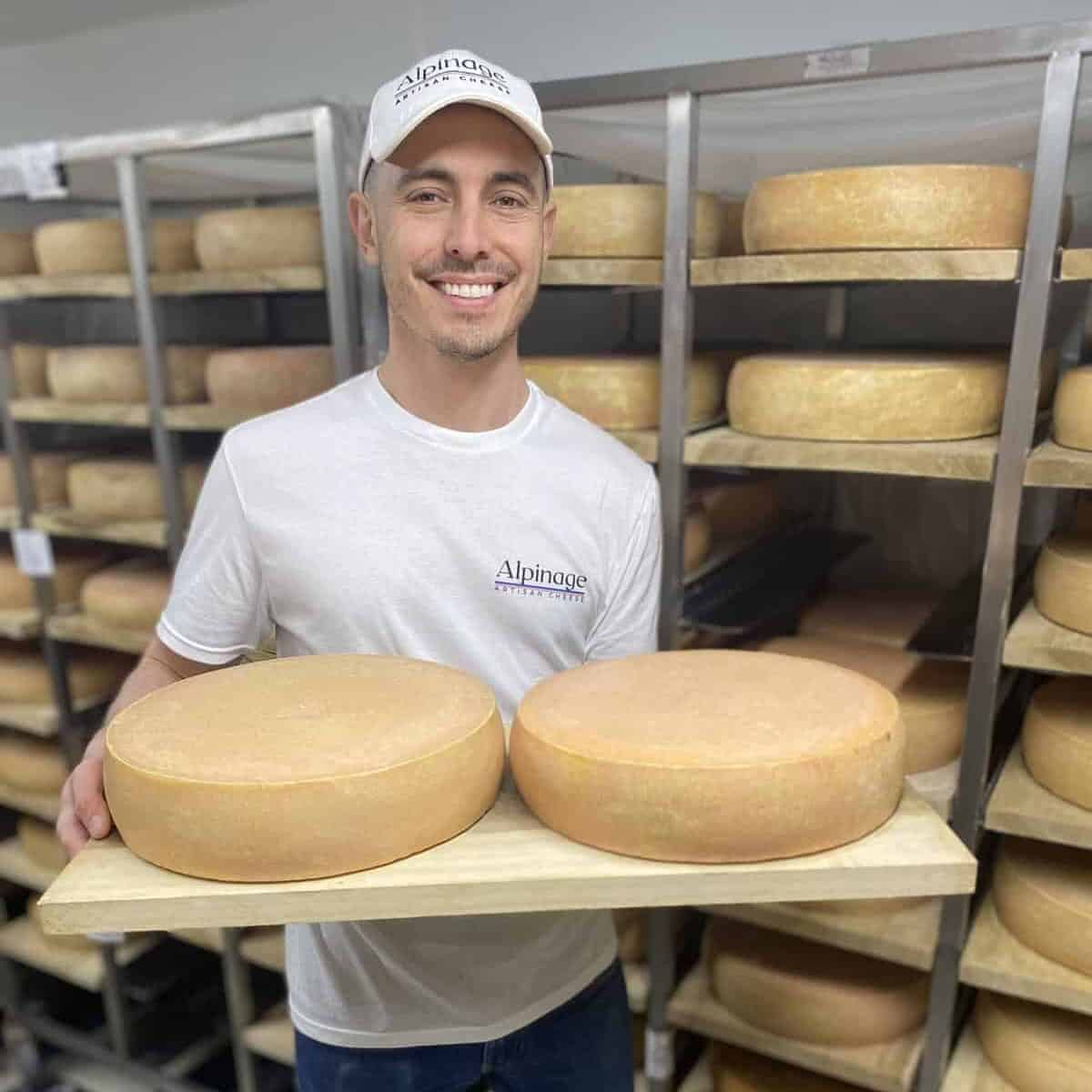
Orphee Paillotin
Founder, Cheesemaker | Alpinage Cheese | Oak Creek, Wis.
I’m French, so I’ve been eating cheese all my life,” says Orphee Paillotin. It’s doubtful, though, that he ever thought he’d be making cheese in Wisconsin. Paillotin came to America’s Dairyland via the corporate world; his former employer has a subsidiary in Racine. When he met his girlfriend, Paula Heimerl, whose parents were co-founders of Saxon Creamery, he began to realize that American cheese was not limited to packaged slices. “I was in transition, and I wanted to do something with food,” he says. In 2019, he began taking classes at the University of Wisconsin–Madison Center for Dairy Research (CDR) and eventually got his cheesemaker license, intent on making raclette for the American market. He quit his corporate job last year.
Why raclette? “It’s a cheese that can please a lot of people, a family cheese for gathering around the table,” Paillotin says. “You don’t need to be a cheese expert to enjoy it. It’s fun. It’s also a winter dish and it’s freaking cold here in Wisconsin.” His original goal was to make a raw milk farmstead raclette, mimicking the traditional French Alpine recipe as closely as possible. “I had never eaten raclette as a table cheese, but we quickly found out that most people here were going to eat it that way, and it was too pungent. I changed the flavor profile a bit to make it a little fruitier, sweeter than its counterparts in Europe.” Now, he says proudly, “We’re making an American raclette.”
Finding a raw milk source with a creamery was a challenge until the CDR connected him with a family farm in Kewaunee County. “I wanted to make the cheese hands-on, and it was the only farm that was willing to open their door to me,” he says. The farm is two hours away from where he and Paula live in Milwaukee; they make cheese there once a week and bring it back to an aging facility much closer to home—which Paillotin used his savings to build—where the wheels are washed and aged in the traditional way on wooden boards. “It was scary at first, and all my friends thought I was crazy, but when we had a cave everything fell into place.”
But it’s still a lot of work. “I see people making cheese a different way now,” he says, adding that he is training the team at the creamery to help with production. He has also started developing his next cheese. “We are making Reblochon— working on it, but it’s not done,” Paillotin says. I will make this one pungent; I have to please the cheesemongers as well.”

Photo by Jack X Li
Veronica Pedraza
Head Cheesemaker | Blakesville Creamery | Port Washington, Wis.
In 2006, Veronica Pedraza was working in a Chicago restaurant where, among her varied duties, she was sourcing cheese for the menu’s cheese plate. “I became fascinated by the fact that we were getting all these different cheeses and they were made from the same four ingredients,” she says. Tired of the restaurant grind, she started to consider a move to either cheese or butchery. “I just started writing cheesemakers whose cheeses I liked, asking if I could apprentice. The one who took the bait was Jeremy Little at Sweet Grass [Dairy].” She spent a year at the Georgia creamery, and then, at Little’s urging, spent another year behind the counter at Saxelby Cheese in New York City. But she didn’t take to mongering. “I think my back-of-the-house persona came out,” she says. Anne Saxelby introduced Pedraza to Mateo Kehler, who offered her a job at Jasper Hill Farm. She worked there for a few years before leaving for Meadowood Farms in New York to make sheep’s milk cheese. “I wanted to see if I was a good cheesemaker or if I was just making good recipes and had good milk,” she says. Then one day at breakfast during the 2017 American Cheese Society Conference, she sat down next to Andy Hatch of Uplands Cheese. “All Andy said to me was, ‘I know a woman with a lot of goats—do you want me to put you in touch with her?’ A month later I got cold called from [Blakesville Farm’s] business manager who said, ‘Andy says you’re the person to talk to; we want to build a farmstead creamery.’”
Pedraza embraced the opportunity to be involved in a woman-owned business that was positioned for success. Blakesville Creamery was licensed in July 2020; the owner gave Pedraza complete creative and operational control, and in just three years her small-format, seasonal cheeses have won multiple national and international awards. Her “favorite child” is Afterglow, a lactic set 5-ounce wheel washed with local cherry ale that’s inspired by the French cheese Langres. “Even though we make cheese that isn’t what you’d associate with Wisconsin, there are resources here,” she says. “It’s really hard to make artisan cheese in an area where there is no infrastructure to support it.”
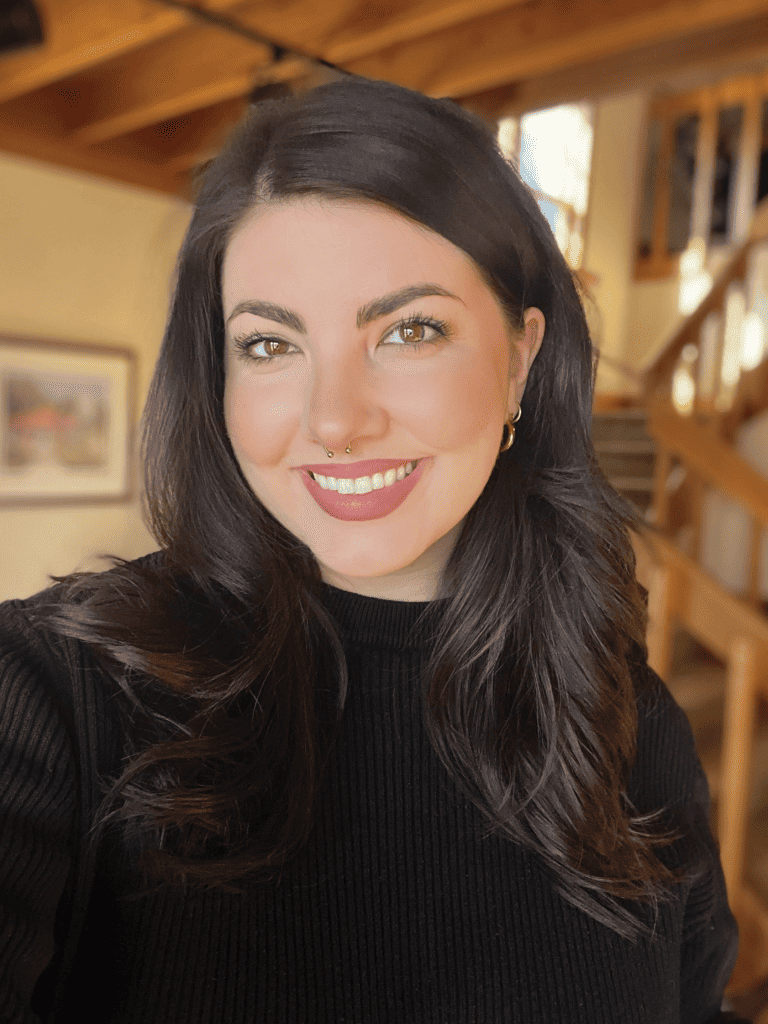
Sophie Gentine
Brand Manager | Deer Creek Cheese | Sheboygan, WIS.
Wisconsin Licensed Cheese Grader #777
Art was the door through which Sophie Gentine entered her family’s business, Deer Creek Cheese. When she was just 14, she began designing Deer Creek’s whimsical cheese labels, starting with pencil sketches she would show to her parents, Julie and Chris, before finishing the designs in watercolor or acrylic paint. “I’ve done some of the fonts as well, like the ones for Indigo Bunting, Imperial Buck, or Rattlesnake—I wrote out a whole alphabet,” Gentine says. While studying Retail and Consumer Behavior and Entrepreneurship at the University of Wisconsin– Madison, she started helping her mom with recipe development and social media, but it wasn’t until the summer of 2021—after a few years working in digital marketing for the beauty industry— that Sophie joined Deer Creek Cheese full time as brand manager. “I have to be a little bit of a jack-of-all-trades because I’m the boss’ kid,” she says. She also works events and shows with her dad, who inspired her to become a licensed cheese grader. Gentine passed Wisconsin’s two-part test in early April and now holds license number 777. “Half is the sensory part, half is knowing what the salts, fats, moisture, and pH should be—the science part,” she says. “I hope to someday have the same palate as my dad because he understands flavor in such a nuanced way—I feel so lucky to have trained under him.”
Gentine says that working with other female graders and cheese professionals—such as Masters Gallery Foods’ VP Sandy Toney and Whole Foods’ Global Cheese Buyer Cathy Strange—has been important for validation and for learning how to better describe what she’s tasting. “What I’ll notice is that I’ll pick out a flavor that’s related to an experience I’ve had, like getting hairspray in my mouth,” she says. “It’s sometimes difficult to describe—what am I tasting, and what does that mean in a technical sense?”
Having a cheese grading license adds another layer to quality control for Deer Creek’s cheeses, and another level of knowledge that will help sustain her career in the industry, Gentine says. “It would be cool to see how I could shape our business to incorporate my interests and maybe even have a brick-and-mortar store.” While she knows her parents will eventually retire, she hopes that doesn’t happen too soon. “I love the industry so much; I can’t see myself doing anything else, realistically. It’s just so much fun.”
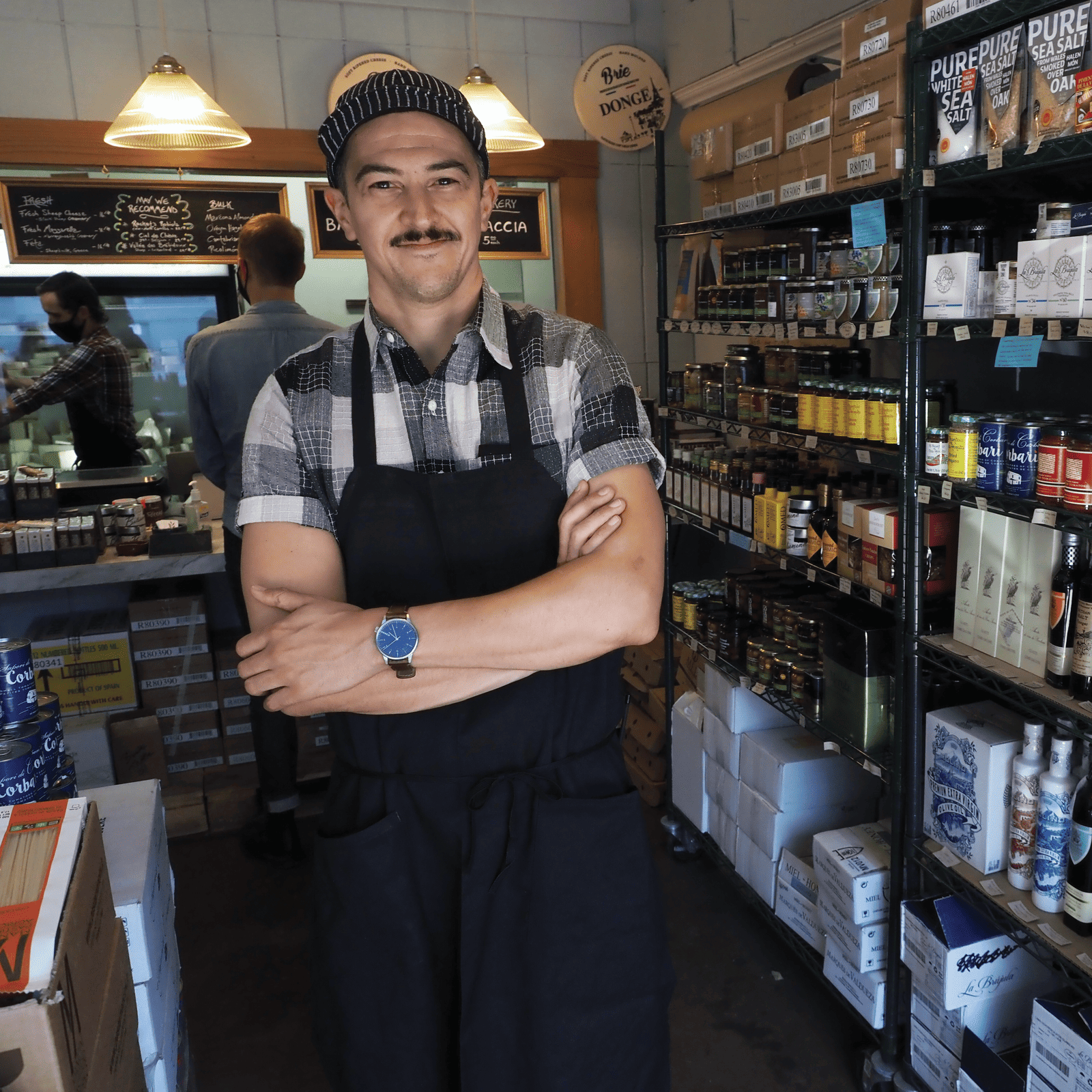
Sam Rollins
Head Cheesemonger & General Manager | Cow Bell Fine Cheese | Portland, Ore.
It’s not uncommon for people in cheese to have a restaurant background, but Sam Rollins was born into one as the son of legendary Oregon restaurateurs Vernon and Charlene Rollins, who operated New Sammy’s Cowboy Bistro for 30 years. “They grew most of the vegetables on the property; it was a labor of love for them and always a model for me,” he says. His parents hoped Rollins would take over the restaurant, but his interest in food took him in a different direction. He got a job at Provisions Market Hall in Eugene as a barista, and six months later, was asked to step in as a manager. “I was given this amazing opportunity of managing a specialty food store’s cheese and charcuterie department while having no idea what I was doing,” he says. “They were really generous about letting me make my own mistakes and learn as I went.” One of his cheese suppliers was Cow Bell Fine Cheese, an importer and distributor in Portland. In 2018, when he and his partner decided to move there, Rollins reached out to the owner for a job. He finally landed one during the pandemic; Cow Bell had laid off all its employees but brought Rollins and another monger in to open a small retail shop. “People in Portland were so eager to support local businesses,” Rollins says.
Cow Bell now has eight employees, which likely helped give Rollins the time and space to prepare for the
Cheesemonger Invitational (CMI) Masters in March, where he won one of two spots on the American team that will compete at September’s Mondial du Fromage in Tours, France. He’ll travel to France twice this year, having earned an all-expenses-paid trip to the Comté region in July for writing the winning 2022 Comté Scholarship essay.
“I love everything about CMI—people working together and supporting and learning from each other. I want to feel that same sense of collegiality on a global scale,” Rollins says. “The level of expertise in Europe is way above and beyond what we’re doing here. The role of the monger here is to make cheese accessible and fun—playing into the friendly side of things rather than the finesse side. It’s not that we’re not capable of it, but it’s a mind switch.” That said, he’s looking forward to seeing what his fellow competitor, Courtney Johnson, brings to the table. “I think she has a great shot of doing something cool at Mondial and I’m going to try to keep up with her.”
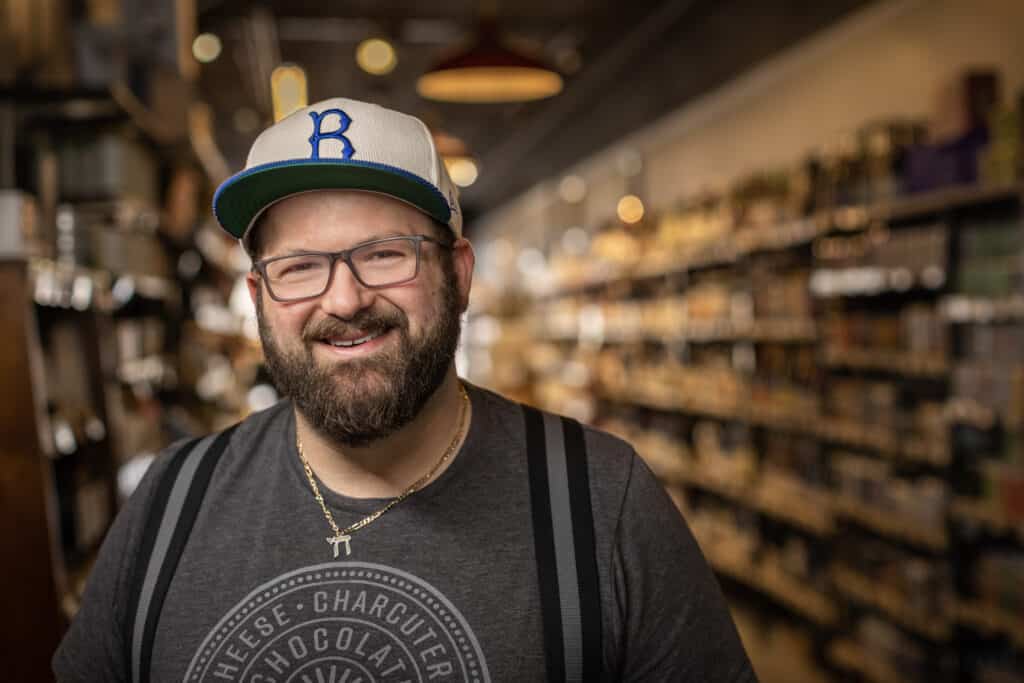
Zach Berg
Co-Owner | Mongers’ Provisions | Detroit and Berkely, Mich.
Zach Berg always thought he would be a chef. The Michigan native worked at Zingerman’s Deli in Ann Arbor after graduating from the School of Hospitality Business at Michigan State University, followed by culinary school in Napa Valley, and stints at Bay Area fine dining restaurants. And then he ran into Ari Weinzwieg, Zingerman’s co-owner, at a book signing. “He said, ‘You look miserable, go back to cheese.’ And he was right,” Berg says. He took his former employer’s advice and got a job at San Francisco’s Bi-Rite Market, where he worked for four years.
“I like to say that as the cheese industry was growing up, I was growing up,” Berg says. He became a Certified Cheese Professional and won second place in the 2014 San Francisco Cheesemonger Invitational. As his career was taking off, he began to think about moving back home. “The triple threat I used to tell people was that I wanted to start a business, meet a woman, and start a family. I left Michigan in 2008 because I couldn’t advance my food career there yet. I moved back in 2016 because of the impossibility of owning a business in San Francisco.”
While he was still in the Bay Area, Berg reconnected with his childhood best friend, Will Werner, who also moved back to Michigan. The two got jobs at a chocolate company and tried to get the owner to sell it to them while they ran chocolate and cheese popups at the shop and at local breweries. “That’s when Will and I realized that there was an opportunity to do something with a little more diversification. We were able to sell more chocolate than before with the cheese popups,” Berg says. They launched Mongers’ Provisions with an 8-foot deli case they installed in a butcher shop in Metro Detroit. “It went gangbusters. Within the first weekend people were telling us we were outgrowing the space.” The partners soon found their own location in Cass Corridor, one of the city’s earliest neighborhoods to gentrify, and opened their first store in 2018, right before the holidays. They opened a second location in Berkley in November 2021. Between the two stores, they now have 17 employees.
“Two stores are it; we’ll figure out how to do more with the resources we have,” Berg says. He has a two-year-old and Werner has six-year-old twins. “We walked into this agreeing that it would be important that we recognize when it was enough, and we would always put our relationship first. The goal is balance.”
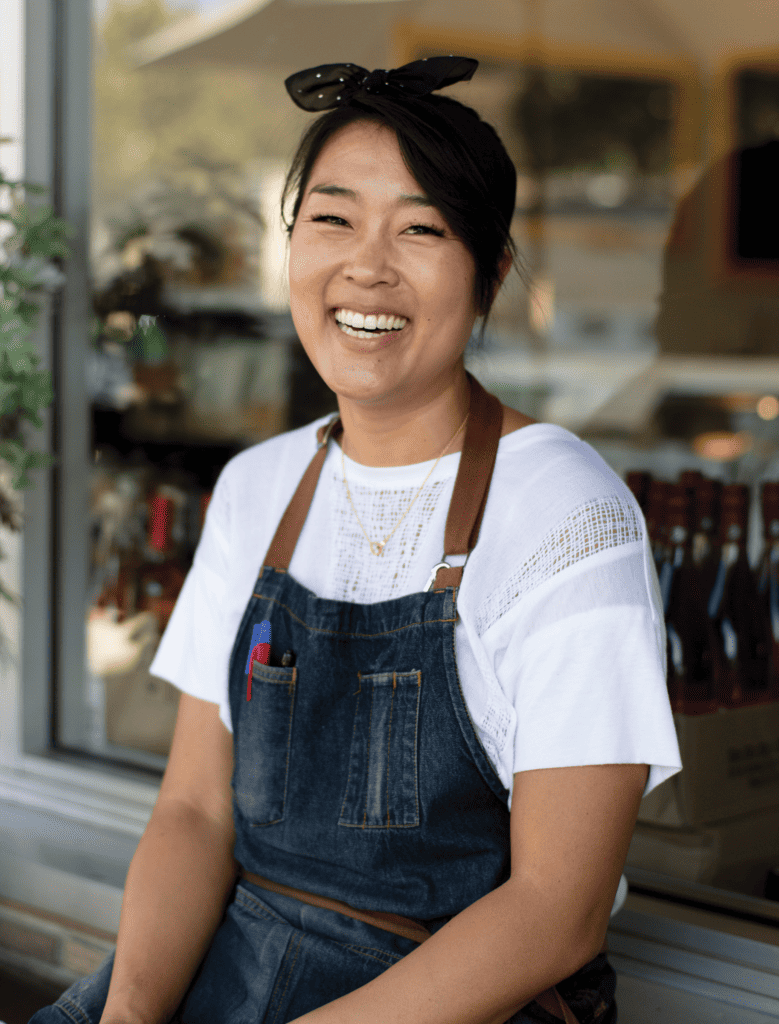
Leah Park
Owner | Milkfarm| Los Angeles, Calif.
Leah Park loves to travel—so much so that she almost didn’t get the job that launched her life in cheese. At 26, after an early career as a pastry chef in high-end hotels in California and elsewhere, she took off around the world for a year-long backpacking trip. When she returned, she realized she wanted to do something different. She had some familiarity with cheese because “in the pastry department at the finer hotels, cheese was always around,” Park says. She called the Cheese Store of Silver Lake to ask about an open position but told the owner she was planning to take a road trip before she could start. “He said, ‘The job might not be here when you get back,’ and I got there in 20 minutes.” Thinking she’d stay for two months, she ended up working at the shop for six years.
“Cheese changed my life,” she says. “Silver Lake was such a hip neighborhood. It kept me connected on the ground floor to people who were moving and shaking and doing things—plus it was fun. It opened my eyes to a different side of the culinary industry that wasn’t so laborious and in the basement under halogen lights.”
She left the Cheese Store in 2013 and opened her shop, Milkfarm, on April 7, 2014, in the Eagle Rock neighborhood of Los Angeles. “The name resonates with me because we’re so far away from farms and farmland that we don’t actually think about where milk and cheese comes from,” Park says. “Sometimes cheese has this stigma of being highfalutin and intimidating. I wanted to make the name accessible to everybody, so I decided to put the words together to create a brand.” She tells an impactful story from her time in Silver Lake, when a customer asked for Sage Derby cheese, pronouncing it “Sagé Derbé.” “She thought it was a fancier product than it actually was,” Park says.
At Milkfarm, which was recently named to Wine Enthusiast’s list of “The 10 Most Iconic Cheese Shops in America,” the casual environment and friendly vibe support her mission to offer a positive experience for everyone. “If someone comes in with $5, I want to make sure they feel comfortable spending it on cheese.”

Photo: Ana Isabel Photography
Lisa Lopez
Cheesemaker | River Whey Creamery | Schertz, Texas
Outreach/Social Director | The Cheese Culture Coalition
Cheese Educator | Lisa’s Daily Cheese Plate
Growing up in a small town east of San Francisco, Lisa Lopez was a picky eater who loved cheese. When her mother took her to a creamery, Lopez got her first look at how her favorite food was made. “There was something about the liquid turning into a solid that messed with my child brain,” she says. But the visit made another impact. “We weren’t treated unkindly, but I didn’t see myself there, I didn’t see Latino people making cheese. I thought maybe Mexican people couldn’t do this.” Lopez draws on that experience in her work as a board member for the Cheese Culture Coalition (CCC). “When we talk about representation so that children can see us in the industry, it really does matter because I was there,” she says.
Years later in Texas, where she has now lived for more than two decades, Lopez was working in the corporate world when she met Susan Rigg from River Whey Creamery at a chocolate and cheese tasting. “She had come from a similar background,” Lisa recalls. “There was something about that night; I saw that Susan was able to transition her career into something she loved, which was cheese. That’s when the bug bit me.” In 2019, Lopez started selling Rigg’s raw-milk cheeses at a local farmers’ market but had to quit when she got a promotion at her job. In her free time, she took cheesemaking classes, attended all of culture’s Virtual Counter Cultures, and earned her first certification from the Academy of Cheese (She is working on her second.)
“Somewhere in all of that, I had been listening to Cutting the Curd for some time, and one day the CCC women were on,” Lisa says. “The message of trying to diversify really hit home with me.” She joined the board in 2021 and works with schools to schedule the CCC’s cheese education classes.
Last October, Lopez took the full-time leap into cheese when she began working at a water buffalo creamery as an apprentice. In February, River Whey’s production manager called her “out of the blue” to offer her a job. “It was a no-brainer for me because Susan’s values about cheesemaking align with mine,” says Lopez.
Eventually, she would like to strike out on her own. “I hope to be the first Mexican-American woman in Texas to own a farmstead creamery and use natural cultures to make my cheeses.” Lopez says. She was recently awarded the Cheeselettes Back in the Vat grant to work with the cheesemakers at Jasper Hill Farm in Vermont. “I realize that I have a lot to learn about natural cheesemaking, but I am doing everything I can to prepare myself for the future.”



